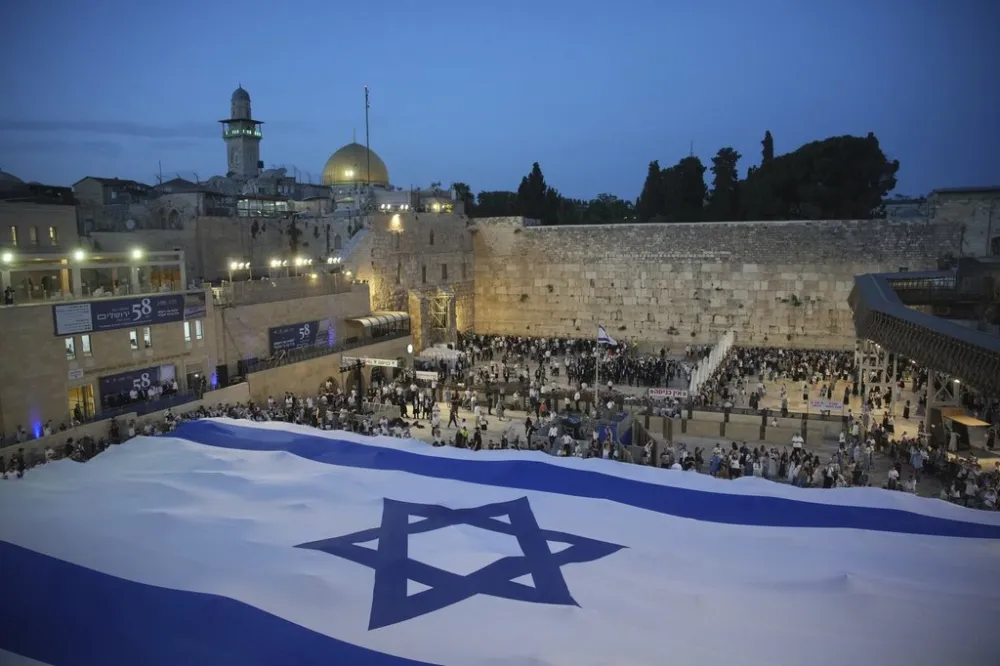JERUSALEM — Thousands of ultranationalist Israeli Jews marched through Muslim neighborhoods of Jerusalem’s Old City on Monday, marking Jerusalem Day with chants of “Death to Arabs” and inflammatory songs like “May your village burn,” in a display that escalated an already volatile atmosphere amid the ongoing Gaza war.

The annual procession, officially called the “Dance of Flags,” commemorates Israel’s capture of East Jerusalem during the 1967 Mideast war — a moment of triumph for many Israelis but a source of deep resentment and tension for Palestinians. This year’s march unfolded as tensions remain high following nearly 600 days of war in Gaza and frequent flare-ups in the West Bank and East Jerusalem.
As the temperatures soared to 98 degrees Fahrenheit (37 Celsius), Israeli police lined the narrow alleys of the Old City to contain potential clashes. Palestinian shopkeepers shuttered businesses early, bracing for violence, which has historically accompanied the march. Tour buses ferried hundreds of young religious nationalists, many from West Bank settlements, to Jerusalem’s historic quarters.
At various points, marchers danced, jumped, and sang nationalist songs under tight police surveillance. Videos captured disturbing moments: one police officer celebrating with marchers, and another group of Jewish youths following a Palestinian woman, hurling racial slurs such as “charmouta”—Arabic for “whore.”
“This is our home, this is our state,” one marcher yelled at a Palestinian woman.
“Go away from here!” she shouted back in Hebrew.
After the march, Arab shopkeepers emerged to clean their vandalized storefronts, many now plastered with stickers declaring, “Gaza is ours.”
Earlier in the day, a group of Israeli protesters, including Israeli lawmaker Yulia Malinovsky, stormed the compound of UNRWA, the U.N. agency for Palestinian refugees, located in East Jerusalem. The group climbed the facility’s gate and held banners demanding the site be converted into an Israeli settlement. Israeli police reportedly stood by as the incident unfolded, though they have not commented publicly.

The UN compound has largely been unoccupied since January after the agency pulled back staff due to escalating threats. The U.N. maintains it has not vacated the site, which remains protected under international law. Israel has accused UNRWA of harboring Hamas operatives, claims that the U.N. denies.
On Monday, Israel’s far-right National Security Minister Itamar Ben-Gvir made a high-profile appearance at the Al-Aqsa Mosque compound, a flashpoint revered by Muslims and Jews. While Israeli law forbids Jewish prayer at the site — known to Jews as the Temple Mount — Ben-Gvir asserted that he is altering that status quo.
“Today, thank God, it is possible to pray on the Temple Mount,” Ben-Gvir said, adding that he was proud to see “many Jews flooding the Temple Mount.”
Activist group Beyadenu, which encourages Jewish visits to the compound, claimed dozens had entered while draped in Israeli flags and offered prayers, a move seen as provocative by Palestinians and international observers.
The Prime Minister’s Office denied any formal policy change regarding prayer at the site. Police clarified that the Jerusalem Day march would not enter the sacred area.
The presence of Israeli lawmakers such as Yitzhak Kroizer, seen praying on the compound, fueled Palestinian fears that Israel is actively eroding the historical agreement governing access and worship at the holy site. Such tensions previously sparked mass unrest, including Hamas’ October 7, 2023, assault on Israel, which cited “desecration” of Al-Aqsa as a motive.
Speaking at an archaeological park in East Jerusalem, Prime Minister Benjamin Netanyahu reaffirmed his commitment to keeping Jerusalem unified under Israeli sovereignty.
“We will preserve a united, whole Jerusalem, and the sovereignty of Israel,” he said. Netanyahu added that his government is investing “billions of shekels” in the city’s development and is pressuring foreign embassies to recognize Jerusalem as Israel’s capital.
Israel annexed East Jerusalem in 1967, a move not recognized internationally. Palestinians envision East Jerusalem as the future capital of a sovereign Palestinian state, making the city a flashpoint in the decades-old conflict.
For many Israelis, Jerusalem Day is a celebration of unification and religious access, particularly to the Western Wall. But for Palestinians, the day represents deepening occupation and systemic discrimination. The march’s trajectory through Palestinian neighborhoods, paired with racist chants and violent provocations, continues to stoke fears of future escalation.
Activists from the Standing Together organization and the Free Jerusalem collective positioned themselves along the route to shield Palestinian residents from aggression. Despite their presence, multiple instances of harassment were documented.
One shopkeeper was seen sweeping bay leaves after marchers kicked over his goods, while others tried to resume normalcy in the wake of the inflammatory display.



